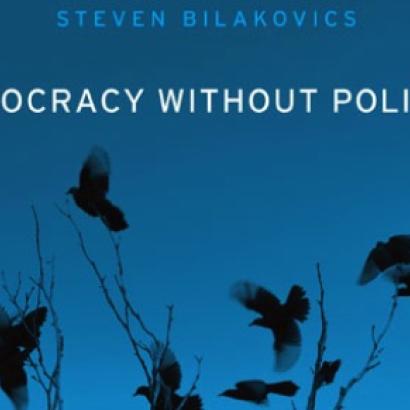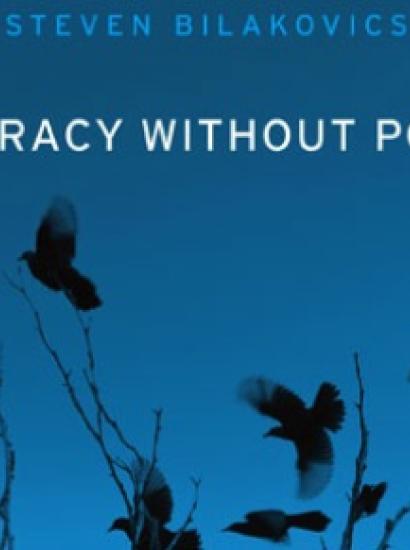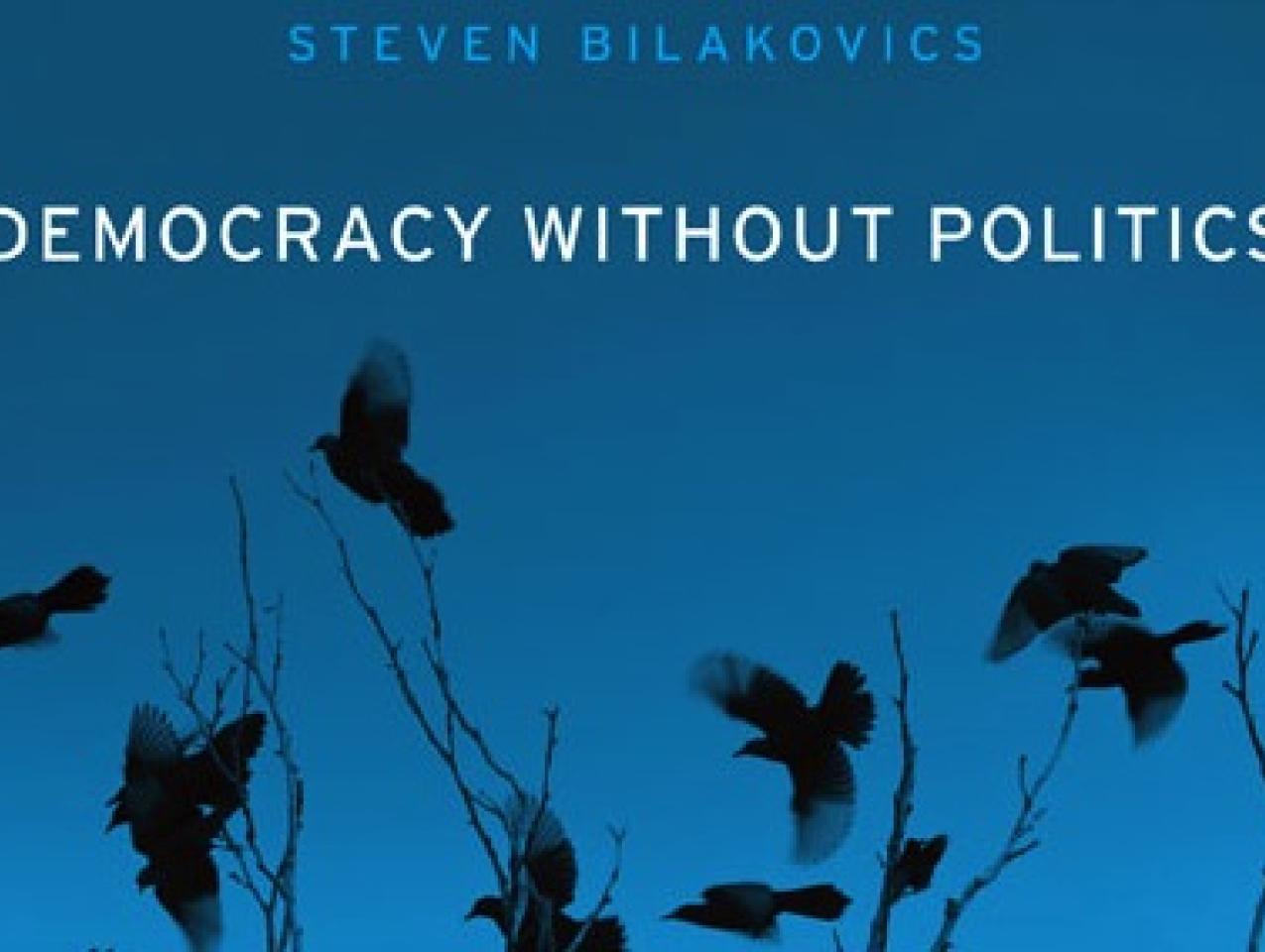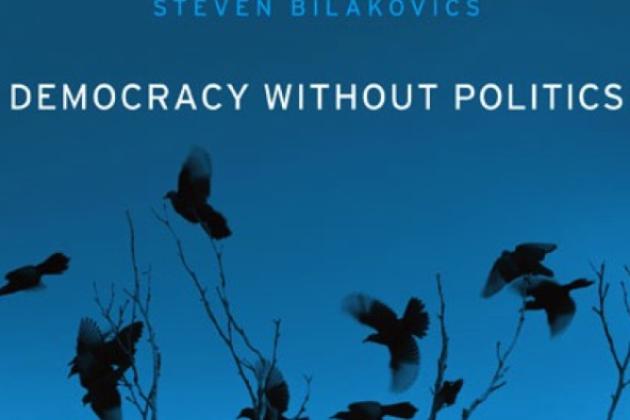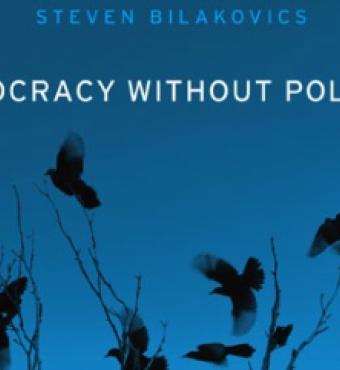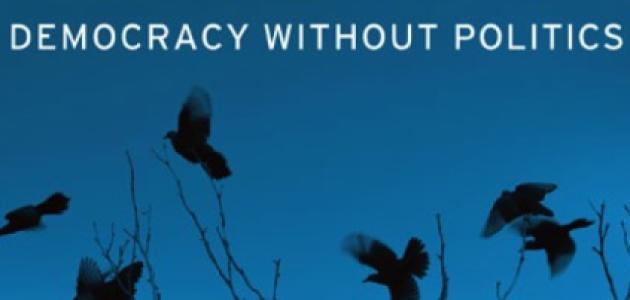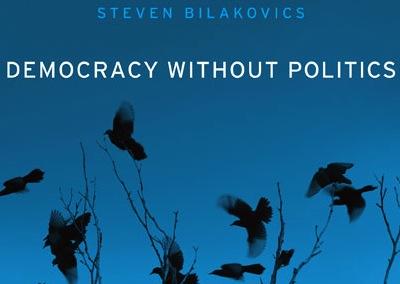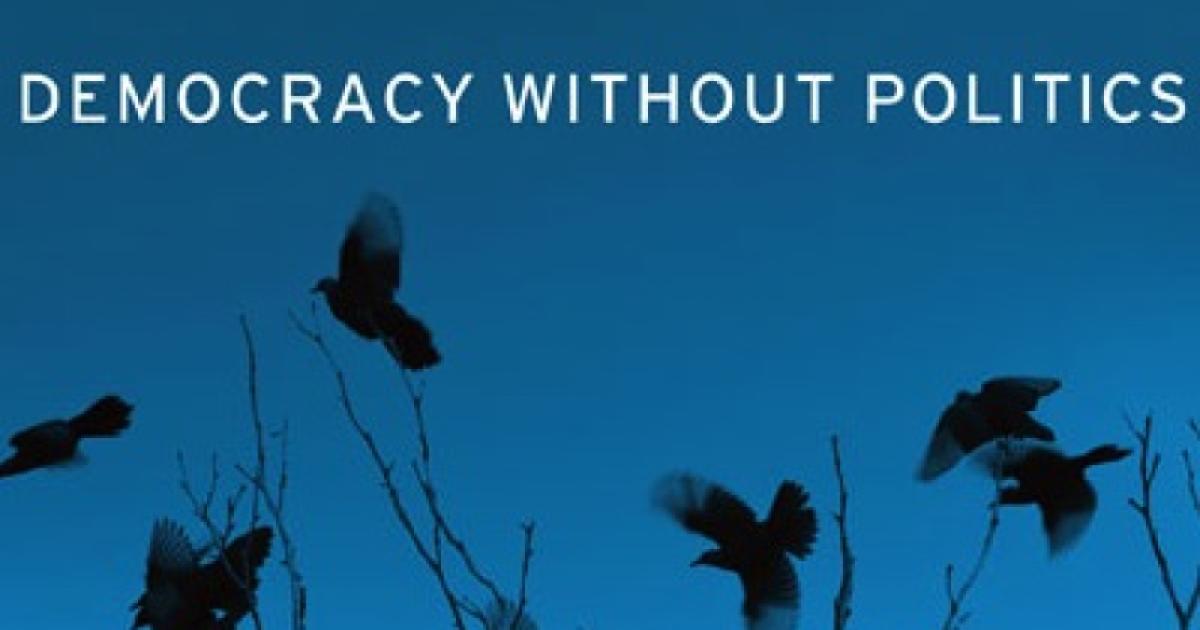- Law & Policy
- Civil Rights & Race
Editor's note: What follows is a review of Democracy Without Politics by Steven Bilakovics (Harvard University Press, 2012).
Steven Bilakovics has written a promising first book that will give concern to all who reflect on democracy today. It begins from the simple observation that although everybody loves democracy, everybody is disgusted by democratic politics. Yet what is democracy if not the rule, the politics, of the people? Democracy is loved in theory and despised in practice, it seems. Its theory requires careful deliberation and argument, but democratic peoples demand decisive and immediate action. How can an anti-political democratic people that cannot stand “politics as usual” be so insistent that democracy is the best form of government?
We must not be dismayed that this simple observation and question are followed by a complicated argument. This is a serious book of political philosophy. Not surprisingly, Bilakovics has recourse first to the analysis of Alexis de Tocqueville, so luminous in appearance—“in broad daylight,” to quote one of Tocqueville’s favorite phrases—yet so difficult to figure out and make consistent. From this analysis Bilakovics concludes that Tocqueville saw democracy as “openness,” open to dualities such as cynicism and idealism, so that we always expect less of democracy at the same time that we expect more of it.
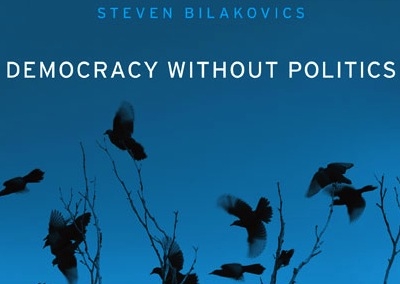
Photo credit: Harvard University Press
Then Bilakovics turns to two veteran philosophers of the present who share this interpretation of Tocqueville. These are the French philosopher Claude Lefort and Sheldon Wolin, retired professor from Berkeley. Both are men of the Left, who I venture to say deserve much more attention than they get, from either Left or Right. Still, this interesting move by Bilakovics forces a departure from the beauties and depth of Tocqueville’s prose to the industrial terrain of academia, even if at its best, where the argumentation loses some of its sparkle. Bilakovics makes this move only to find the two professors inadequate in their analysis of openness, and he ends on his own, with an interpretation he admits is not quite faithful to Tocqueville. He both admires and criticizes his two fellow interpreters of Tocqueville.
“Openness” is not a term of Tocqueville’s. It is true, as Bilakovics notes, that in Tocqueville’s conception, democracy tends toward formlessness and limitlessness. Democracy is hostile, or at least temperamentally averse, to forms and limits—whether political as constitutions, social as manners, or literary as conventions—because these are restraints on the people’s will. They prevent democracy from charging ahead, heedless and even ruthless, toward greater equality. On the first page of Democracy in America, Tocqueville declares that the “primary fact” in America is “equality of conditions,” toward which “a great democratic revolution” elsewhere, particularly in Europe, is also taking place.
By contrast, Bilakovics understands the democratic revolution as not so much toward a formless equality as toward a dualism of two extremes having two opposed forms. Where Tocqueville stresses the relentlessness of the democratic demand for equality, impossible to stop and difficult even to oppose, resulting in a general mediocrity throughout the democratic “social state” suited to the desires of most citizens, Bilakovics finds a dualism of extremes offering an open choice to all. Where Tocqueville sees danger to liberty from the passion for equality that imposes its will to level all differences, Bilakovics sees the formlessness of democracy as opening up possibilities, denying limitations, and hence creating new liberties.
Democracy is loved in theory but despised in practice.
The dualisms Bilakovics sees in Tocqueville are between the impracticality of literary society and the inveterate materialism of commercial pursuits, between limitless elevation of the soul and unplumbed degradation, and between creator and created, master and puppet, where there is “seldom anything in-between.”
Tocqueville almost uses the above phrase in a chapter on “why American writers and orators are often bombastic.” He says that there is “nothing in-between,” or more literally, “the intermediate space is empty,” implying that there might have been something there. In democratic societies, each citizen is habitually occupied in the contemplation of a very small object: himself. If he raises his eyes, he sees only the “immense object of society” or even the whole human race. If he leaves his normal concerns, he expects it to be for something indefinitely vast instead of something definite and greater than himself.
He forsakes the great for the ”gigantic,” Tocqueville says. He demands extravagance from democracy’s poets and orators, and this is what he gets. What is noble and great is characteristic of aristocracy, where poets and orators display the best. But in a democracy, the self-centered citizen ignores the best and needs something gigantic when he lifts his attention from himself.
Tocqueville’s dualism, unlike Bilakovics’, is not within democracy between low self-interest and lofty nobility. Rather, it is a contrast between democracy and aristocracy. Democratic peoples are habitually mundane, but they do not always stay “very close to the earth” because it is in human nature, occasionally at least, to be drawn out of oneself; that is why Tocqueville says that religion is natural to man.
But he fears that the poetry of democratic peoples will “lose itself in the clouds,” offer “immense and incoherent images,” and in the end, distracted by bizarre and fantastic beings, “make one long for the real world.” When democrats in their ordinary everydayness turn to poetry, their fancies become abstract and vague, precisely reflecting their inability to find anything definite when they rise above themselves. Their fancies are mere magnifications of themselves, with loss of detail—or they are grandiose distortions that are hardly human.
Our form of government is hostile to limits for they are restraints on the people's will.
Nor, as Bilakovics says, is “master and puppet” a dualism, if we understand puppet to be “servant.” Tocqueville says that in “enlightened and free democratic centuries” men rise and fall; all classes live close together; the servant “never considers himself entirely a stranger to the pleasures and works of the master.” In democracies, equality imposes itself even on the inequalities it cannot abolish. If its citizens are not equal to one another, they think they are equal; they consider themselves “similar” (semblables).
It is sometimes objected that America is not and never has been as equal as Tocqueville says, that nothing there “struck my eye more vividly” than the “equality of conditions.” But of course there are inequalities of intelligence and ambition arising from human nature or God, which take effect in society. Americans deal with this truth by treating one another as equal even though they are not. Where they do not find equality, they equalize by finding similarity, thus doing their best to deny a dualism between equality and inequality.
The most important of the questionable dualisms that Bilakovics sees in Tocqueville’s thought is that of materialism and idealism. He is right to recognize both the taste for material enjoyments and an ideal of humanity in Tocqueville’s democracy. But again, the democratic ideal is in thrall to the material, and the true dualism is between democracy and aristocracy, Tocqueville’s theme in Democracy in America. In democracy, the desire for material enjoyments arises from the lack of authority that is the nature of democracy. If all are equal, why should anyone be in authority while others obey?
Democracy struggles to find an answer and comes only with difficulty to the practice of self-government and democratic association as solutions. These solutions require that democrats step out of their private lives and go beyond the exercise of private rights. They must learn the “art of being free” and make themselves into citizens so as to practice the exertions of political liberty. The solutions are ever in danger from the temptation to stay at home, to be satisfied with private satisfactions, and to depend on the “immense being” of government for one’s security.
In the democratic social state, citizens, recognizing no authority, see no authoritative goal to pursue in life. In an aristocracy, men would be shown long-term goals in service to an ideal of nobility or of salvation displayed in those who are in positions of authority. But in democracy, lacking such a view, the people look around, and seeing nothing to which they might devote themselves, conclude that they must grasp at material advantages that are immediate and palpable.
The American mind closed when it embraced openness wholesale.
Democracy as such is preoccupied with material self-interest. Democrats do not need the “spirit of capitalism” to transform them into bourgeois who have no time or taste for politics. What they need is just the contrary; they need help against theories that discourage the practice of politics.
Oblivious to the demanding requirements and the fragile practice of political liberty, which Tocqueville saw only in America, come the blundering theorists of materialism, whom Tocqueville attacks with an indignation not surpassed by his outrage at American slavery. These are democratic theorists (or historians) because they attribute causal force not to individual human beings, as do aristocrats, but rather to massive, impersonal movements beyond human control, such as climate or race. Tocqueville is always concerned with what theorists teach, whether considerately or inadvertently, and these ones teach resignation and passivity as opposed to the sense of responsibility needed for political liberty. They present an ideal of perfectibility, not for individuals but for all of humanity—an ideal that offers indefinite improvement in human affairs without requiring human efforts to obtain it. It is an irrational “perfectibility,” neither defined nor achieved by reason, a perfectibility without a notion of perfection that advances in what we call material progress, without foresight or reflection.
The theorists of materialism tell us that the long term will take care of itself so long as we do not obstruct materialism in the short run in our everyday lives. With a view to supporting political liberty, Tocqueville wants to limit everyday materialism and to concern us with a long-term goal, such as improving our immortal souls. This is why he fears for the state of democratic souls and speaks so strongly, if not fervently, in favor of religion. This is also why he showed such disgust for socialism.
For Tocqueville, democracy is a whole rather than an open society riven by dualisms, as it is in Bilakovics’ formulation. The trouble is that there are two wholes in the human world—“as it were two distinct humanities,” says Tocqueville—democracy and aristocracy. He does not believe that a mix of the best of each is possible; the bias of each is too opposed to the other. But a political scientist like Tocqueville comprehends the two ways of looking at men, as equal and as unequal. Both equality and inequality are in human nature, which is a single whole, but which cannot be made actual as a whole. Each of the two humanities applies its bias to human nature, and the result is two partisan wholes, each of them determined to see everything from its standpoint. Bilakovics does not sufficiently consider human nature and the phenomenon of human partisanship that completes and distorts human nature.
In praising the openness of democracy, it is surprising that Bilakovics does not refer to Allan Bloom’s famous book, The Closing of the American Mind, now at its twenty-fifth anniversary. According to Bloom, the closing of the American mind is the consequence of its embrace of openness. To be “open” as it is usually meant is to receive what one is given—in a democracy, that would be by the majority or by public opinion. It means going with the flow, adjusting to “change” as it comes upon us. This is precisely the conformism that Tocqueville feared from democracy, “the moral empire of the majority.”
Bilakovics has written a thoughtful book, nicely argued, and with elegant formulations one can admire and insights one can learn from. But it is not Tocqueville; it is something looser, more “open.” A defense of openness is not as open as the openness it defends, especially a good one like this, because it must contend intelligibly with arguments, such as Allan Bloom’s, in favor of reasonable limits upon openness. Somehow a reasoner ought to take the side of reason. I leave this thought, with a salute, to the author, and to Claude Lefort and Sheldon Wolin, who still deserve more attention than they get.








